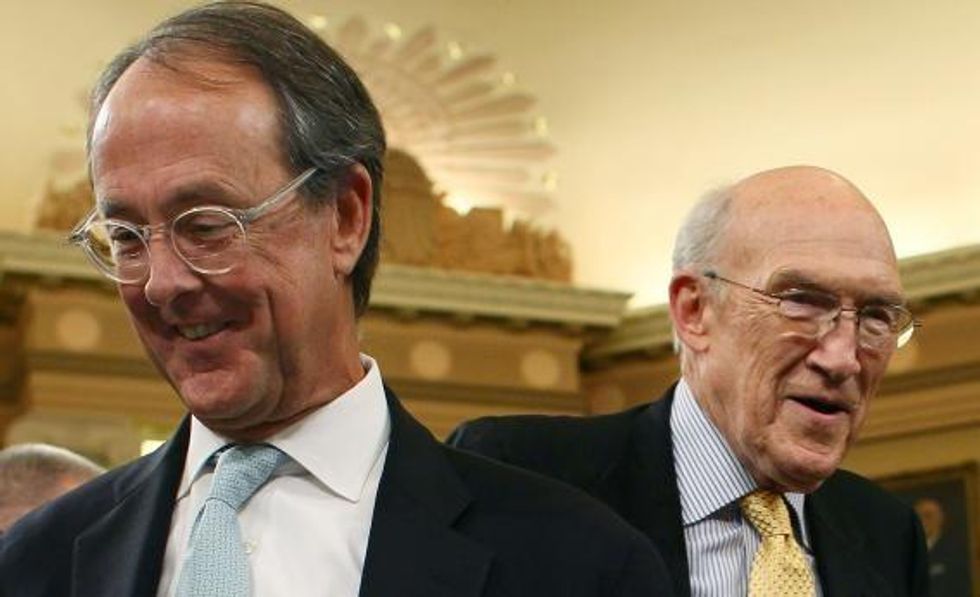Why It Matters That There's No Such Thing as Simpson-Bowles
Dan Balz, the Washington Post's chief correspondent (5/20/12), complains that President Barack Obama hasn't solved America's fiscal problems:

Obama has drawn criticism for failing to offer more forceful leadership. He established the Simpson-Bowles commission but declined opportunities at key moments to push and prod for its consideration and enactment.
There's an odd syntax here that reflects some slippery thinking. Grammatically, "its" in the second sentence seems like it would refer to the Simpson-Bowles commission, but that would be nonsensical. You're presumably supposed to think it means the commission's plan, but that's a trick-there was no plan passed by the commission as a whole. Instead, the co-chairs, Alan Simpson and Erskine Bowles, came up with their own plan that they were unable to get the required supermajority of the committee to sign off on.
Balz wants you to think that doesn't matter-that there was a plan involving Simpson and Bowles, and it got the support of 11 of the 18 committee members, so that's pretty much the Bowles-Simpson commission's plan, right?
The 'Bowles/Simpson' plan "essentially saw deficit-reduction as an opportunity to redistribute income upwards: by capping government revenues, cutting tax rates for the wealthy and corporations (while raising them for the middle class), lowering Social Security benefits and making the elderly pay more for their healthcare."
Well, no-actually, it matters a great deal that it didn't get the 14 votes it needed to be adopted by the commission. As in most media discussions of Simpson-Bowles, Balz doesn't really talk about what the plan Simpson and Bowles came up with actually does. They essentially saw deficit-reduction as an opportunity to redistribute income upwards: by capping government revenues, cutting tax rates for the wealthy and corporations (while raising them for the middle class), lowering Social Security benefits and making the elderly pay more for their healthcare.
In other words, their plan has a lot of elements that are deeply unpopular. If you want an agenda like that enacted, the only way to do so is to get Republicans and Democrats to both sign on to it. If only one side supports it, the other side will-and should-point to all the unpopular things their opponents are supporting. That's what certainly would have happened if Obama had made a point of talking about what a great plan Simpson and Bowles had.
The people who set up the commission understood this perfectly well, which is why they put in a supermajority requirement that could be met only if a majority on each side agreed on a proposal. A plan that only one party agreed to was a plan that was going to fail. Pundits like Balz, on the other hand, either don't understand this - or are hoping that you won't.
An Urgent Message From Our Co-Founder
Dear Common Dreams reader, The U.S. is on a fast track to authoritarianism like nothing I've ever seen. Meanwhile, corporate news outlets are utterly capitulating to Trump, twisting their coverage to avoid drawing his ire while lining up to stuff cash in his pockets. That's why I believe that Common Dreams is doing the best and most consequential reporting that we've ever done. Our small but mighty team is a progressive reporting powerhouse, covering the news every day that the corporate media never will. Our mission has always been simple: To inform. To inspire. And to ignite change for the common good. Now here's the key piece that I want all our readers to understand: None of this would be possible without your financial support. That's not just some fundraising cliche. It's the absolute and literal truth. We don't accept corporate advertising and never will. We don't have a paywall because we don't think people should be blocked from critical news based on their ability to pay. Everything we do is funded by the donations of readers like you. Will you donate now to help power the nonprofit, independent reporting of Common Dreams? Thank you for being a vital member of our community. Together, we can keep independent journalism alive when it’s needed most. - Craig Brown, Co-founder |
Dan Balz, the Washington Post's chief correspondent (5/20/12), complains that President Barack Obama hasn't solved America's fiscal problems:

Obama has drawn criticism for failing to offer more forceful leadership. He established the Simpson-Bowles commission but declined opportunities at key moments to push and prod for its consideration and enactment.
There's an odd syntax here that reflects some slippery thinking. Grammatically, "its" in the second sentence seems like it would refer to the Simpson-Bowles commission, but that would be nonsensical. You're presumably supposed to think it means the commission's plan, but that's a trick-there was no plan passed by the commission as a whole. Instead, the co-chairs, Alan Simpson and Erskine Bowles, came up with their own plan that they were unable to get the required supermajority of the committee to sign off on.
Balz wants you to think that doesn't matter-that there was a plan involving Simpson and Bowles, and it got the support of 11 of the 18 committee members, so that's pretty much the Bowles-Simpson commission's plan, right?
The 'Bowles/Simpson' plan "essentially saw deficit-reduction as an opportunity to redistribute income upwards: by capping government revenues, cutting tax rates for the wealthy and corporations (while raising them for the middle class), lowering Social Security benefits and making the elderly pay more for their healthcare."
Well, no-actually, it matters a great deal that it didn't get the 14 votes it needed to be adopted by the commission. As in most media discussions of Simpson-Bowles, Balz doesn't really talk about what the plan Simpson and Bowles came up with actually does. They essentially saw deficit-reduction as an opportunity to redistribute income upwards: by capping government revenues, cutting tax rates for the wealthy and corporations (while raising them for the middle class), lowering Social Security benefits and making the elderly pay more for their healthcare.
In other words, their plan has a lot of elements that are deeply unpopular. If you want an agenda like that enacted, the only way to do so is to get Republicans and Democrats to both sign on to it. If only one side supports it, the other side will-and should-point to all the unpopular things their opponents are supporting. That's what certainly would have happened if Obama had made a point of talking about what a great plan Simpson and Bowles had.
The people who set up the commission understood this perfectly well, which is why they put in a supermajority requirement that could be met only if a majority on each side agreed on a proposal. A plan that only one party agreed to was a plan that was going to fail. Pundits like Balz, on the other hand, either don't understand this - or are hoping that you won't.
Dan Balz, the Washington Post's chief correspondent (5/20/12), complains that President Barack Obama hasn't solved America's fiscal problems:

Obama has drawn criticism for failing to offer more forceful leadership. He established the Simpson-Bowles commission but declined opportunities at key moments to push and prod for its consideration and enactment.
There's an odd syntax here that reflects some slippery thinking. Grammatically, "its" in the second sentence seems like it would refer to the Simpson-Bowles commission, but that would be nonsensical. You're presumably supposed to think it means the commission's plan, but that's a trick-there was no plan passed by the commission as a whole. Instead, the co-chairs, Alan Simpson and Erskine Bowles, came up with their own plan that they were unable to get the required supermajority of the committee to sign off on.
Balz wants you to think that doesn't matter-that there was a plan involving Simpson and Bowles, and it got the support of 11 of the 18 committee members, so that's pretty much the Bowles-Simpson commission's plan, right?
The 'Bowles/Simpson' plan "essentially saw deficit-reduction as an opportunity to redistribute income upwards: by capping government revenues, cutting tax rates for the wealthy and corporations (while raising them for the middle class), lowering Social Security benefits and making the elderly pay more for their healthcare."
Well, no-actually, it matters a great deal that it didn't get the 14 votes it needed to be adopted by the commission. As in most media discussions of Simpson-Bowles, Balz doesn't really talk about what the plan Simpson and Bowles came up with actually does. They essentially saw deficit-reduction as an opportunity to redistribute income upwards: by capping government revenues, cutting tax rates for the wealthy and corporations (while raising them for the middle class), lowering Social Security benefits and making the elderly pay more for their healthcare.
In other words, their plan has a lot of elements that are deeply unpopular. If you want an agenda like that enacted, the only way to do so is to get Republicans and Democrats to both sign on to it. If only one side supports it, the other side will-and should-point to all the unpopular things their opponents are supporting. That's what certainly would have happened if Obama had made a point of talking about what a great plan Simpson and Bowles had.
The people who set up the commission understood this perfectly well, which is why they put in a supermajority requirement that could be met only if a majority on each side agreed on a proposal. A plan that only one party agreed to was a plan that was going to fail. Pundits like Balz, on the other hand, either don't understand this - or are hoping that you won't.

